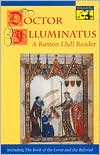

 |

|

The average rating for Doctor Illuminatus: A Ramon Llull Reader based on 2 reviews is 5 stars.
Review # 1 was written on 2014-05-20 00:00:00 Anna Introcaso Anna IntrocasoRamon Llull was a Franciscan, Christian mystic, philosopher and logician; he was also an evangelist to Muslims in the late 13th-early 14th centuries. I became interested in him because I had read that he influenced Nicholas Of Cusa, a Christian Platonist writer that I was quite impressed with. Llull's Ars Brevis (or the Art in Brief) is one of the most fascinating and original applications of Aristotelian terms and categories I've ever seen. Llull developed a complex system of logic based on interconnected diagrammatic categories and compartmentalized terms labeled more or less alphabetically. The purpose was to seemingly explore theological and philosophical ideas in a very thorough process by means of specific queries; e.g. are God's attributes equally eternal? etc. The ins and outs of Llull's system are too complex to go over in this review and cannot be explained comprehensively without actually viewing the diagrams and reading Llull's elucidations. I have not fully comprehended it myself, even after reading it once through; and it will take a bit of study for me to completely appreciate how it works and how it can, and is, to be utilized. It has interested me enough that I have purchased Giordano Bruno's adaptation of the Llullian art in his own art of memory mnemonics, found in his work entitled The Shadows Of Ideas. It should be noted that Llull's work found an audience with occultists and esotericists. The manner of presentation seemed to have lent itself to uses beyond those imagined by Llull -sadly. It seems to have been misused later by Cabalists, alchemists and others for shady purposes. One does not at all get the sense that Llull intended it for any other purpose than meticulously exploring philosophical and theological categories in logical and methodical ways. In fact, one of his main uses for the Art was to prove the Trinity when debating Muslims. I had read the Book Of The Lover And Beloved previously, so I skipped that work in here. I also skipped the Book Of The Beasts because the subject matter didn't really interest me. The Book Of The Lover And Beloved is a mystical work that does utilize some Llullian concepts. It will warrant me rereading it now that I am more familiar with his system. It basically is an example of Franciscan mysticism with a Llullian spin. His work The Book Of The Gentile And The Three Wise Men is about a non-religious who comes across three wise men each subscribing to one of the Abrahamic faiths. Each one is able to speak on behalf of his religion in order to convince the non-religious gentile to accept their faith. As with Llull's other works, Llull refers to the system he developed in the narrative. I recommend the work, but it has to be noted that it has to be studied, not just read. The systematic nature of his art requires a bit of dedication that many readers most likely won't have. |
Review # 2 was written on 2012-02-20 00:00:00 Min H Mebarkia Min H MebarkiaI heard about Ramon Llull, a 13th c. Catalan philosopher, from a passing mention in Vanished Kingdoms. The breadth of his interests are well represented in this anthology of four works. The first is The Book of the Gentile. An atheist meets three wise men: a Jew, a Christian, and a Saracen. Each tries to convince him of his religion's superiority to the other two. Each gives compelling and accurate arguments. The book is surprisingly broadminded and the ambiguous ending feels quite modern. The second is The Book of the Lover and the Beloved, a collection of 366 verses inspired by Sufism, but with a Christian theme. The third is The Book of the Beasts, which is a political fable about a kingdom of animals with a Machiavellian subtext. The final piece is the Ars Brevis in which Llull outlines his combinatoric method of using logic to build a philosophy. It suggests that Llull would have been a brilliant mathematician if he had lived in a later age (I found a website that produced an elaborate program using Llull's Art -- probably a better way of understanding it than this text, which is quite abstract). |
CAN'T FIND WHAT YOU'RE LOOKING FOR? CLICK HERE!!!